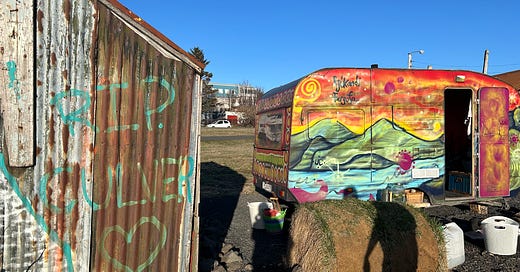Let it die.
Change is hard because it can involve relinquishing an identity that was familiar, favoured and "who I am." Let it go.
Wild heart spotted on an outbuilding next to the Rjúkandi fargufa, a mobile Finnish sauna my friend took me to in Reykjavik. Ten people go in the little camper, an extraordinarily gorgeous woman (the Sauna Master) lights a fire in a stove and adds steam and sometimes there are essential oils involved and sexy electronica is blared while you’re instructed to close your eyes and take deep breaths together, or at least that’s what you assume because they also don’t speak English. Every 15 minutes, everyone goes outside to eat grapefruit slices and drink ginger tea and then puts wetsuit booties on and enters the North Atlantic Ocean to squeal and float and swim. Repeat, while the sun sets. When your whole system is rearranged, it’s time to change in a weird rusty old shack with only two walls and then you go for dinner. Amazing. We do everything in the most uptight way here in the west.
“I wish I’d had the courage to live a life true to myself,
not the life others expected of me.”
(quote from Bronnie Ware’s book, the Top Five Regrets of the Dying)
It hurts to look back on the human experience only to find that the use of this one wild and precious life was to betray your own heart’s desire, usually out of duty, fear or ignorance of some kind.
And yet. When a crossroads appears, we hesitate. Things people say in therapy sessions:
He’s not that bad.
They invited me to speak at the event, but I think they had the wrong idea about what I know. The person who ended up doing it was way more polished than me.
I’ll become a _____ next year.
Internal Family Systems therapy teaches us we meet a person’s protectors first. Sometimes in the therapy room we stay with that group for a long time, witness to the well crafted messages intended to persuade that the fearful, small responses to life are the best and most logical. To them, that is true.
To be justified in living small is not why people hire a therapist, though. It is a betrayal to the therapeutic relationship to help people accommodate to lives of pain. Sometimes we need to speak to the protectors. I see you, I understand why you’re here and why you did that, I wonder if you might be open to looking at things in a different way.
In the yoga sutras, Patanjali introduced the klesas, or the mental patterns that keep us stuck in life. There are five: ignorance, ego, attachment, aversion and fear of death.
The klesa that fits this reluctance is abhinivesha, or the deep, often unconscious fear of death.
Studying abhinivesha as a therapist, what came to my mind was the suffering I see in people when they are forced to give up an identity somehow. In that process, there is a kind of death in life as it was known.
Transitions like:
*going from beloved and adored to single again
*realizing the dream life will never happen, at least how you’ve imagined it
*coming to terms with a change in physical body status, from young to old, able to disabled, well to sick, even if the new status has better offerings
The reason people come to therapy for the above is because the loss of an identity can be excruciating and discombobulating. We dedicate much of our lives to the processes of becoming, kind of with the unsaid expectation that if we just work hard enough and do all the right things, everything will work out. If/when it doesn’t, because of course we can’t control destiny and sometimes just aren’t ready for the dreams we say we want, the reality check can be hard.
But what is this other than an act of abhinivesha, clinging to life?
In this issue, let’s explore how to use Internal Family Systems theory and narrative therapy to work through that tension. If you understand the above and hear the value of “letting go,” but still come up against the same claustrophobic feelings of frustration and impotence when forced to shift out of a comfy old identity, it was your heart in my mind when I wrote this. Because: same. We’ll end with a little bit of homework to set you on the right path.




